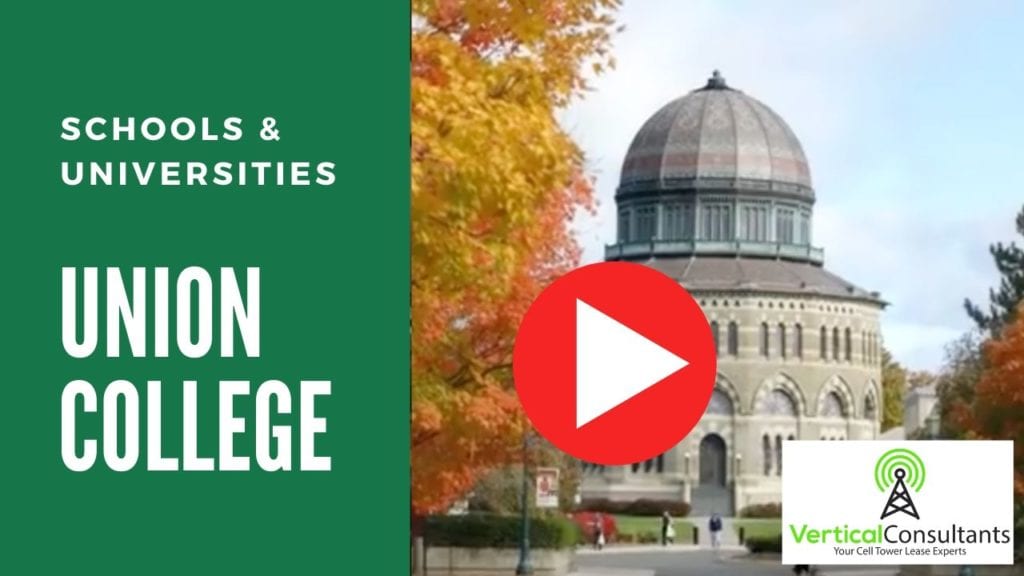Schools & Universities Can Make Great Cell Tower Sites
Vertical Consultants is seeing that most cities are becoming more and more restrictive on where they will allow cell tower companies to build these days. They are doing this by imposing stricter zoning regulations for the placement of cell towers on a limited sector of properties.
The result is that school districts can become an oasis in the middle of the desert. That being especially the case in areas which are mostly residential in their layout. Vertical Consultants has experience working for municipalities, churches and schools in their negotiation and structuring of cell tower and rooftop agreements with some of the largest telecom companies in North America.
 Verizon contacted us and we chose Vertical Consultants to assist us. It was the right choice. – Mark, Peoria School District
Verizon contacted us and we chose Vertical Consultants to assist us. It was the right choice. – Mark, Peoria School DistrictThe Tower Company’s Last Resort?
Due to the unique locations where most schools are located, they can optimize the structure of the cell tower agreement they are being offered or the ones that they already have in place. We continually make our clients aware they have to understand what the cell tower is both getting out of your property and what the detriment is if they cant occupy and use your land.
 We were looking for results and Vertical Consultants delivered. We recommend them to your organization. – Joe, Chaska School District
We were looking for results and Vertical Consultants delivered. We recommend them to your organization. – Joe, Chaska School DistrictIf a cell phone carrier has approached your school district, you may be the last option they have when it comes to constructing a cell site in your neighborhood. We work with our clients to identify the “real” cell site options a tower company has in our client’s immediate area, and that is the first step in making the best deal for our clients.
Vertical Consultants works with schools of all types and sizes across the United States in making sure they not only get the best cell tower rent possible, but that they get a lease which protects them and their property. We can review your property and the cell tower lease provided to determine your best options.
 We were looking to maximize the value of our cell site lease. Vertical Consultants help made that happen. – Geoff, University of Wisconsin
We were looking to maximize the value of our cell site lease. Vertical Consultants help made that happen. – Geoff, University of WisconsinGet A Free Lease Agreement Review and Consultation – We Can Immediately Increase Your Cell Tower Rents
Cell Sites 101: Are Colleges/Universities Making The Grade?
One of the growing questions that colleges and universities face is how to improve cell site service on its campuses. Today’s students expect and, to some extent, rely upon cell services more than any other subset of the current United States population.
This reliance can be evidenced by the following statistics:
- Over 85% of college students own a smartphone
- Over 75% of college students check their smartphone within one hour of waking up in the morning
- Almost 80% of college students sleep with their smartphone by their bed
- 73% of college students use their smartphone when lost
- Smartphone data traffic is scheduled to exceed PC traffic by 2020
Most colleges rely upon a traditional cell tower on or adjacent to their campus to provide cell services to their students, facilities and guests. However, many times college campuses are expansive and covered with large buildings, underground parking areas and other buildings that can be prohibitive when it comes to cell site reception. In addition, unlike other areas, students use a tremendous amount of data and are using applications that need an above average amount of wireless bandwidth.
So, what solutions exist for colleges and universities looking to improve cell site service on their properties? The following are a few solutions:
- Rooftop Antenna Arrays: Antenna arrays fall into the traditional macro site classification and include the installation of anywhere from 3-12 cellular antennas on a building rooftop and can provide services for the entire campus. In addition, the leasing out of space on rooftops can provide additional revenue for the college via rents paid by the applicable wireless carriers, with these rents ranging from $1,500.00 to over $5,000.00 per month.
- Distributed Antenna System (“DAS”): This option is basically an independent, standalone wireless network that distributes a wireless cell signal to a series of small antennas located around a campus, especially to areas that require coverage and have higher than average data capacity needs. The DAS alternative is especially beneficial when it comes to serving certain indoor areas that are usually dead spots on your campus.
- Small Cells: Small cell equipment is becoming more and more prevalent due to wireless carriers like AT&T, Verizon, Sprint and T-Mobile’s need to meet ever-growing wireless data capacity usage in high density areas, such as a college environment. Small cells are usually a fraction of the size of the afore-mentioned antenna arrays and take up considerably less space on the rooftop. Small cell installation can serve to both handle wireless needs on your campus and as a source of additional revenue by the leasing of space to a wireless carrier.
Many colleges and universities have already taken steps to improve wireless service on their properties by the integration of some form of cell site upgrade throughout their campus. Some of the most relevant questions that universities have regarding these projects are:
- Who Pays?
There are ways that a cellular upgrade can be achieved. A college or university can install a wireless network itself. They can structure an agreement by which the wireless carriers fund the installation of the wireless network in exchange for the carrier’s access to certain areas of the campus, or, the best of all worlds, they can allow access to the campus for certain license or leasing fees, while also obtaining access to such wireless network for itself and it students.
- Who Controls?
The control of any wireless network installed on a campus will depend mostly upon who has paid to install such wireless infrastructure. If a college or university wishes to control a wireless network, it also will need the internal resources to do so, or it must engage a third-party management company to do so for them. If the wireless network is owned/controlled by a wireless carrier, the college or university can then contractually gain access to such network for its own purposes.
- Will It Be Compatible?
It is especially important that, in the case of a DAS network model, future compatibility be part of the equation on the front-end negotiation and structuring of any deal. If a carrier installs a DAS network, it will most likely only be compatible with that carrier’s current and future technology. As a result, it will be very difficult for the college to integrate its or other wireless carriers into that network when it needs to do so in the future. A neutral host wireless system can solve this integration issue and will most likely be the preferred solution in the future for most campus-wide projects.
In summary, it will become more and more important that colleges and universities address the fact that there may be no place that having cellular service is as important as on its very own campus. Students attending a school may not only want, but also expect/demand certain levels of wireless service to satisfy their needs, ranging from providing them access to applications, assist them with school driven projects, leisure activities, to those who provide security/safety measures for them while they are on and around campus.
Contact us today if your school has questions about solving its wireless network needs and, at the same time, generating rental revenues to add to its bottom line.




